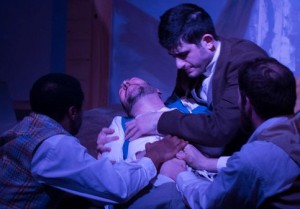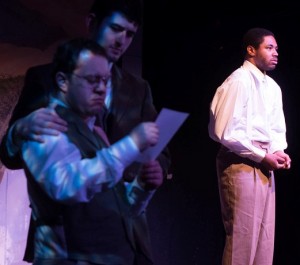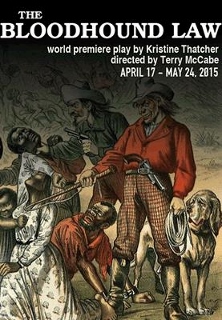CHICAGO’S CIVIL WAR
A grand dream is now completed. Over the last five years City Lit has delivered five old and new works to mark the Sesquicentennial of the Civil War, now finished with the 150th anniversary of the Appomattox surrender. Ending the reckoning is the series’ most documentary-like drama: Set in Illinois in the years before organized fighting broke out, The Bloodhound Law is Chicago playwright Kristine Thatcher’s accounting of seminal episodes detailing the shame and glory of the Land of Lincoln.
 Unfortunately, it’s also the Land of Lovejoy–Elijah Lovejoy, an abolitionist journalist who fled from mob oppression in the border state of Missouri across the Mississippi to Alton. There he felt he’d found freedom. In sharp and stirring scenes, taut and true under Terry McCabe’s direction, we see Lovejoy (Christopher Kidder-Mostrom) facing down opponents who charge him with encouraging slave rebellion and promoting “amalgamation” of the races. How dare he endanger the profits from the auctions of human beings, the dividing of families and the denial of dignity by upstanding Christian traders and slavers! As today, so then–religious freedom was threatened by arrogantly literal interpretations of the New Testament.
Unfortunately, it’s also the Land of Lovejoy–Elijah Lovejoy, an abolitionist journalist who fled from mob oppression in the border state of Missouri across the Mississippi to Alton. There he felt he’d found freedom. In sharp and stirring scenes, taut and true under Terry McCabe’s direction, we see Lovejoy (Christopher Kidder-Mostrom) facing down opponents who charge him with encouraging slave rebellion and promoting “amalgamation” of the races. How dare he endanger the profits from the auctions of human beings, the dividing of families and the denial of dignity by upstanding Christian traders and slavers! As today, so then–religious freedom was threatened by arrogantly literal interpretations of the New Testament.
Like John Brown in 1859, in 1837 the righteous 34-year-old editor of the “Alton Observer” became a martyr for free speech and one of the first casualties of the conflict to come. No one was convicted of Lovejoy’s murder or the destruction of his printing press, reason enough to remember the utterly gratuitous sacrifice of this father and husband.
Set in 1850 and 1851 in Chicago, Washington City and Toronto, the second act traces Lovejoy’s legacy to Chicago. It focuses on a dramatic showdown between Senator Stephen Douglas and the Chicago Common Council. In the ante-bellum years our inland metropolis was caught up in the clash between property rights and “popular sovereignty” (a euphemism for letting the non-slave-owning majority keep a new state free).
 The agitation came to a boil over the enforcement of the Fugitive Slave Act (the play’s sarcastic title). Illinois (whose southern border stretched further into the future Confederacy than any other Northern state) was as divided as the nation by a despised edict. This invitation to insurrection was the spawn of the morally bankrupt Compromise of 1850. In effect the F.S.A. turned all Americans into potential kidnappers of runaway slaves and freemen who could become first-time chattels, victims of false claims. (“Any nigger will do,” as one slavecatcher puts it.) With the “underground railway” shut down in sections, many ex-slaves sought refuge in Canada, as, later, war protesters would during the Vietnam conflict.
The agitation came to a boil over the enforcement of the Fugitive Slave Act (the play’s sarcastic title). Illinois (whose southern border stretched further into the future Confederacy than any other Northern state) was as divided as the nation by a despised edict. This invitation to insurrection was the spawn of the morally bankrupt Compromise of 1850. In effect the F.S.A. turned all Americans into potential kidnappers of runaway slaves and freemen who could become first-time chattels, victims of false claims. (“Any nigger will do,” as one slavecatcher puts it.) With the “underground railway” shut down in sections, many ex-slaves sought refuge in Canada, as, later, war protesters would during the Vietnam conflict.
Eight years before he defeated Abraham Lincoln to win a third term, Douglas engineered the F.S.A. (later backed up the Supreme Court in the infamous Dred Scott decision). Here the diminutive legislator (David Fink) faces down anti-slavery proponents (Rob Glidden and Alex Glossman) and freemen testifiers as they seek to nullify a terrible wrong enshrined in law. Bending with the wind, Mayor James Curtiss is far more pliable than the present occupant.
Playing many parts, McCabe’s dedicated cast of nine depict a host of worthies and unworthies–judges (one actually named Lawless), senators (Henry Clay, Thomas Hart Benton, Andrew Butler), representatives, reporters, aldermen, bailiffs, preachers, and, most movingly, the men in bondage (Brian Bradford and David Lawrence Hamilton) who were fought over by North and South alike. Thatcher’s two-act, 105-minute reenactment is a feat of remembrance, large (a Negro police force was proposed for self-protection in Chicago) and small (pepper was useful to throw off the baying bloodhounds pursuing freedom seekers).
Given so much expository material, there are some wooden moments where declamation replaces eloquence. But overall The Bloodhound Law is an invaluable chronicle of a turbulent time not unlike the present. In time the Defense of Marriage Act will seem as antiquated as the Fugitive Slave Act: It always helps when the past puts the present in perspective.
photos by Tom McGrath
The Bloodhound Law
City Lit
Edgewater Presbyterian Church
1020 West Bryn Mawr Ave.
Fri & Sat at 7:30; Sun at 3
scheduled to end on May 24, 2015
for tickets, call 773.293.3682 or visit www.citylit.org
for Chicago Theater info, visit www.TheatreinChicago.com

